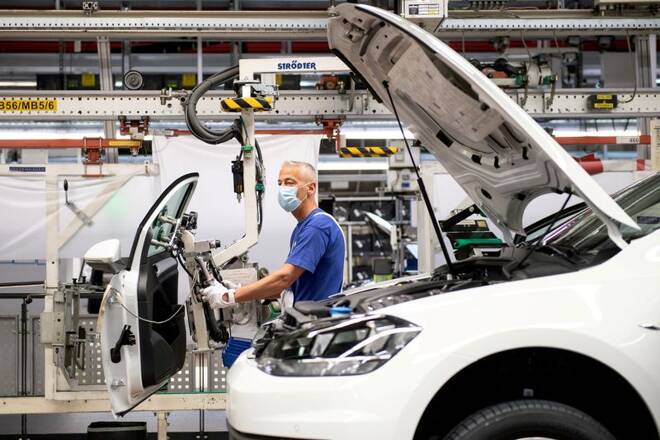Advertisement
Advertisement
Hopes grow for inflation relief as German producer prices fall
By:
BERLIN (Reuters) - German producer prices fell unexpectedly on the month in October, due primarily to a dip in prices for electricity and distributed natural gas, according to data released on Monday.
By Miranda Murray and Balazs Koranyi
BERLIN (Reuters) -German producer prices posted their first monthly fall in two and a half years in October, according to data released on Monday, raising hopes that double-digit inflation in Europe’s largest economy could be nearing its peak.
Producer prices of industrial products fell 4.2% on the month, due primarily to dips in prices for electricity and distributed natural gas, the Federal Statistical Office reported. Analysts polled by Reuters had forecast a rise of 0.9%.
This is likely to be welcome news, even if only at the margins, for the European Central Bank, which has been raising rates aggressively to tame price pressures.
Producer price growth has fed into overall inflation at a faster pace in the past year than normal, so any broader reversal in pipeline pressures could reinforce expectations for consumer price growth to peak in the fourth quarter.
But underlying inflation, now around 5%, has shown little sign of easing, and detailed October data released last week showed broad and mounting price pressures.
“The underlying inflation pressure, using whichever metric you want to look at, does not show signs of stabilisation – so there is really nothing for the doves in this reading,” Danske Bank economist Piet Haines Christiansen said.
Commerzbank’s Ralph Solveen said the figures “give cause for hope the inflation rate for consumer prices will also soon reach its peak. However, this does not mean that the inflation problem is over.”
A survey conducted by the Ifo economic institute showed that many German businesses were not through with passing on their soaring costs to customers.
It found that companies had passed on just 34% of their purchase price increases over the past few months. They plan to raise this to 50% by April, according to Ifo.
Germany’s consumer prices, harmonised to compare with other European countries, were 11.6% higher year-on-year in October.
The German government is planning to introduce gas and electricity price brakes from early next year to curb inflation, which it expects to reach 8% this year and 7% in 2023.
Compared with October 2021, producer prices of industrial products rose 34.5% last month, signalling some relief after maintaining a record pace in August and September of 45.8%.
(Reporting by Rene Wagner, Miranda Murray and Paul Carrel; writing by Rachel More; editing by Nick Macfie)
About the Author
Reuterscontributor
Reuters, the news and media division of Thomson Reuters, is the world’s largest international multimedia news provider reaching more than one billion people every day. Reuters provides trusted business, financial, national, and international news to professionals via Thomson Reuters desktops, the world's media organizations, and directly to consumers at Reuters.com and via Reuters TV. Learn more about Thomson Reuters products:
Latest news and analysis
Advertisement
